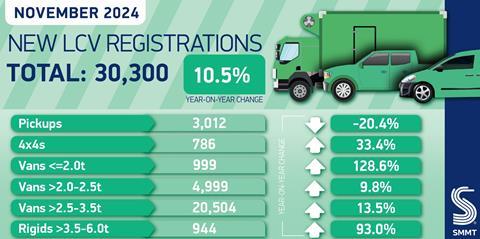
The new light commercial vehicle (LCV) market recorded its fourth consecutive month of growth as registrations rose by 10.5% in November, according to the latest figures from the Society of Motor Manufacturers and Traders (SMMT).
With 30,300 new vans, pick-ups and 4x4s registered, it was the second biggest November ever for the market.
Electric van uptake grew for the second consecutive month after four months of decline, rising by more than a third (36.7%) to 2,322 units, in part supported by the Plug-in Van Grant, which will now continue for the next financial year. Market share also rose, from 6.1% to 7.7%. However, government has mandated that 10% of each brand’s new van registrations must be zero emission this year and year-to-date market share has reversed compared with 2023, down from 5.9% to 5.8%.
The SMMT says massive industry investment means that half of all van models are now available as zero-emission. However, with no obvious plan for a national network of van-specific chargepoints, companies and traders continue to lack the confidence to switch in greater volumes. The latest market outlook expects volume growth of more than 85% in 2025 – but this would still leave the BEV share of the market at just 10.6% next year against a mandated target of 16%.
The Society says concerns over the impact of the zero emission vehicle mandate on buyer choice, volume delivery and UK industrial competitiveness are mounting. The government’s decision to review the regulation has, therefore, been welcomed by industry which remains committed to delivering decarbonisation against the current market realities.
Mike Hawes, SMMT chief executive, says: “The UK LCV market continues to build back after a challenging start to the year, delivering the best performance since 2021 and the unleashing of pent-up demand. Britain’s appetite for zero emission vans continues to lag behind government ambition, however, and market share this year is heading in the wrong direction. With warnings over UK competitiveness now translating into tangible impacts, a fast-tracked review of market regulation is essential to ensure manufacturers can deliver the choice, growth and decarbonisation the nation needs.”


























